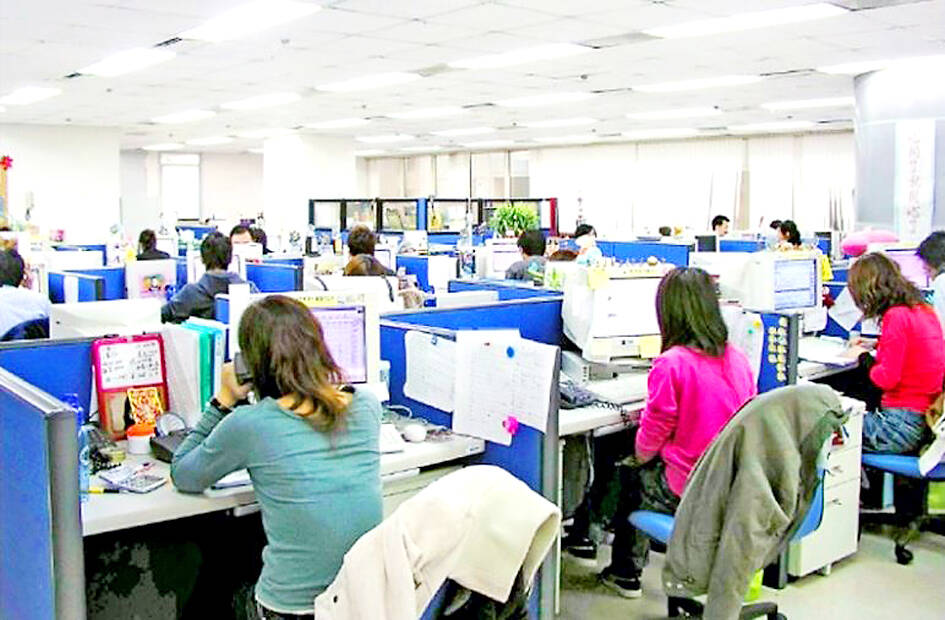The government is obligated to respond by the end of next month to a proposal that would make Taiwan the first Asian country to allow workers three days off per week, after the suggestion was endorsed by more than 5,700 people on the Public Policy Online Participation Network Platform.
Although Taiwan’s average work hours per year dropped to 2,000 hours in 2021, it still ranked the fourth-highest in the world, said a person identified only as Lukas, who proposed the policy change on the platform.
An experiment on a four-day work week in the UK, with 69 companies and more than 2,900 employees participating, showed that corporations’ revenue jumped an average of 35 percent during the trial period compared with a year earlier, while average worker turnover dropped to 57 percent, the proposal says.

Photo: Taipei Times
Moreover, 92 percent of the companies in the six-month trial opted to continue the practice after the experiment ended, it says.
As of April 26, the local proposal had been endorsed by 5,736 people, surpassing the required 5,000, and obligating the government to give a response by June 26, based on the rules of the platform.
Another proposal on the platform, by a person called Yenfei (煙緋), proposed amending Article 30 of the Labor Standards Act (勞動基準法) to limit work to six to seven hours per day and 30 to 35 hours per week. Overtime hours can also be included in the weekly work hours.
As of May 2, the proposal had been endorsed by 5,140 people, and the government has to respond by July 2.
“Most workers in Taiwan spend more than 12 hours at work, including time commuting to and from work, and overtime. Taiwanese workers are overworked compared with their peers in advanced countries,” the proposal says.
Shortening work hours would increase rest time for workers and reduce occupational hazards, traffic accidents and the spread of diseases, it says.
With reduced work hours, more young people would be willing to start a family, it says.
Huang Wei-chen (黃維琛), director of the Ministry of Labor’s Department of Labor Standards and Equal Employment, said the ministry would have to discuss the issue first with the people who made the proposals to avoid any misunderstanding.
“We will assess how the policy change would affect different government agencies and provide an official response before the deadline,” Huang said.
A three days off a week policy would affect not only workers, but also teachers, civil servants, military personnel and students, Huang said.
“We need to consult the Ministry of Education about its opinion as well,” he said. “Shortening work hours would involve an amendment of the Labor Standards Act, and we need to consult business and labor groups and other government agencies.”
Vice Premier Cheng Wen-tsan (鄭文燦) said that no Asian country has adopted a four-day work week, but the government would respond to the person who made the proposal and brief them about work hour trends.

STILL COMMITTED: The US opposes any forced change to the ‘status quo’ in the Strait, but also does not seek conflict, US Secretary of State Marco Rubio said US President Donald Trump’s administration released US$5.3 billion in previously frozen foreign aid, including US$870 million in security exemptions for programs in Taiwan, a list of exemptions reviewed by Reuters showed. Trump ordered a 90-day pause on foreign aid shortly after taking office on Jan. 20, halting funding for everything from programs that fight starvation and deadly diseases to providing shelters for millions of displaced people across the globe. US Secretary of State Marco Rubio, who has said that all foreign assistance must align with Trump’s “America First” priorities, issued waivers late last month on military aid to Israel and Egypt, the

France’s nuclear-powered aircraft carrier and accompanying warships were in the Philippines yesterday after holding combat drills with Philippine forces in the disputed South China Sea in a show of firepower that would likely antagonize China. The Charles de Gaulle on Friday docked at Subic Bay, a former US naval base northwest of Manila, for a break after more than two months of deployment in the Indo-Pacific region. The French carrier engaged with security allies for contingency readiness and to promote regional security, including with Philippine forces, navy ships and fighter jets. They held anti-submarine warfare drills and aerial combat training on Friday in

COMBAT READINESS: The military is reviewing weaponry, personnel resources, and mobilization and recovery forces to adjust defense strategies, the defense minister said The military has released a photograph of Minister of National Defense Wellington Koo (顧立雄) appearing to sit beside a US general during the annual Han Kuang military exercises on Friday last week in a historic first. In the photo, Koo, who was presiding over the drills with high-level officers, appears to be sitting next to US Marine Corps Major General Jay Bargeron, the director of strategic planning and policy of the US Indo-Pacific Command, although only Bargeron’s name tag is visible in the seat as “J5 Maj General.” It is the first time the military has released a photo of an active

CHANGE OF MIND: The Chinese crew at first showed a willingness to cooperate, but later regretted that when the ship arrived at the port and refused to enter Togolese Republic-registered Chinese freighter Hong Tai (宏泰號) and its crew have been detained on suspicion of deliberately damaging a submarine cable connecting Taiwan proper and Penghu County, the Coast Guard Administration said in a statement yesterday. The case would be subject to a “national security-level investigation” by the Tainan District Prosecutors’ Office, it added. The administration said that it had been monitoring the ship since 7:10pm on Saturday when it appeared to be loitering in waters about 6 nautical miles (11km) northwest of Tainan’s Chiang Chun Fishing Port, adding that the ship’s location was about 0.5 nautical miles north of the No.